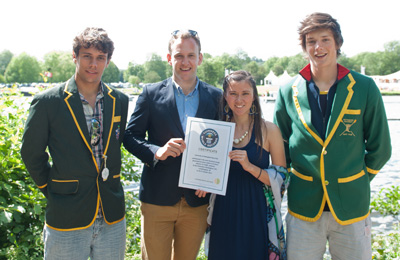World Record for Rowers Who Generated Enough Electricity to Power a House for a Day
Posted by Concept2 News on the 10th of July 2012

It is official! The University of Nottingham has set a new Guinness World Record for the most electrical energy generated by indoor rowers in 24 hours. A relay of rowers converted shear muscle power into 12.4kWh of energy - that's enough electricity to power a typical three-bed house for a whole day.
Members of the Nottingham University Boat Club and the Faculty of Engineering masterminded the world record attempt which was a highlight of the official launch of the University's £150m fund raising campaign Impact: The Nottingham Campaign in October last year.
With no one rowing less than three minutes and a maximum time of up to half an hour on the machines the rowers broke through their own target to set the new record. Although the majority of were boat club members many other volunteers took part in the 24-hour challenge.
Mark Gillott, Professor of Sustainable Building Design and Co-Director Institute of Sustainable Energy Technology, said: "To put this into perspective 12.4kWh is approximately the amount of electricity a typical three bed house would use in a 24 hour period - this record really highlights how much human effort would be required to generate our own domestic electrical energy needs!"
Jessica Fok, the University Boat Club President, said: "This is a fantastic achievement by all involved, from the rowers themselves to the technical experts in the Faculty of Engineering who made the whole thing possible. Our challenge clashed with preparations for a British Universities event but still our rowers turned up in large numbers. They even kept going after they'd reached their original target. I would also like to say a big thank you to all the non-rowing volunteers who had a go and helped us set this new world record."
A Feat of Engineering
A fleet of Concept 2 rowing machines had to be specially converted to generate power and a special monitoring interface was created by a group of University engineers had to keep track of the power generation. To set anything near a world record the resistance gearing on the machines had to be set at a very high level to generate enough power. The power they generated was used to light a bank of 50w car headlamp bulbs - to ensure that the rowers could see when they were slacking!

Among the engineers responsible for setting up the equipment was Professor Seamus Garvey who also ran up a total of seven stints of three minutes each in the early hours of the morning. He said: "Although there were some slight technical hitches at the start and we were consistently underestimating the electrical power being generated, as the later calibration showed, it was a lot of fun."
Physically Demanding
Nigel Mayglothling, Assistant Director of Sport at the University, said: "This has to be one of the most physically demanding things I've been involved in. I struggled to keep up the pace. It was a fantastic effort by everyone - especially those who did the night shift."
The Guinness world record certificate was presented to the club at last week's Henley Royal Regatta by Ian Wilson, an ex-international oarsman himself and the managing director of Concept2 whose rowing machines were used for the record-breaking achievement.
Mr Wilson said: "This is an incredible achievement by the boat club and engineers. I often get asked by customers if they can generate useful electricity from Concepts' exercise equipment and this record really demonstrates how little electricity an individual can produce from exercise machines when compared to our daily electrical energy requirements. - One house needing a large team of athletes just to keep it running"
The world record attempt was one of the main features of the week-long launch of the University's largest ever fundraising campaign which aims to transform research, enhance student experience and help the University make an even greater contribution to the global communities it serves.
More information is available from Professor Mark Gillott, at The University of Nottingham, on +44 (0)115 8467677, [email protected]; or Lindsay Brooke, Media Relations Manager at The University of Nottingham on +44 (0)115 9515751.
For up to the minute media alerts follow us on Twitter
Notes to editors: The University of Nottingham, described by The Sunday Times University Guide 2011 as 'the embodiment of the modern international university', has 42,000 students at award-winning campuses in the United Kingdom, China and Malaysia. It is also the most popular university in the UK by 2012 application numbers, and 'the world's greenest university'. It is ranked in the UK's Top 10 and the World's Top 75 universities by the Shanghai Jiao Tong (SJTU) and the QS World University Rankings.
More than 90 per cent of research at The University of Nottingham is of international quality, according to the most recent Research Assessment Exercise. The University aims to be recognised around the world for its signature contributions, especially in global food security, energy & sustainability, and health. The University won a Queen's Anniversary Prize for Higher and Further Education in 2011, for its research into global food security.
Impact: The Nottingham Campaign, its biggest ever fund-raising campaign, will deliver the University's vision to change lives, tackle global issues and shape the future.


 RSS Feed
RSS Feed